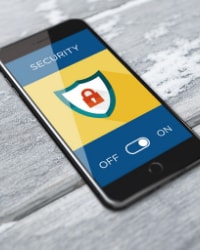Staying Cyber Smart while on the Go
By: Linda Stevenson, Chief Information Officer
In this day and age, we have technology within reach at all times, even on the go. While these devices make our lives earlier, they can contain a  lot of sensitive personal information. Use these tips from the National Cyber Security Alliance to make sure you are using your mobile devices safely and protecting your personal information.
lot of sensitive personal information. Use these tips from the National Cyber Security Alliance to make sure you are using your mobile devices safely and protecting your personal information.
Protect your personal information
Your personal information is very valuable and it’s important to take steps to protect it as you connect to the world through your mobile devices.
- Secure your devices. Use strong passwords or touch ID features to lock your devices. These security measures can help protect your information if your devices are lost or stolen and keep prying eyes out.
- Think before you app. Information about you such as the games you like to play, your contact list, where you shop, and your location has value. Be thoughtful about who you share that information with and how it is collected through apps.
- Disable wireless connectivity. Some stores and other locations look for devices with WiFi or Bluetooth turned on to track your movements while you’re in range. Disable WiFi and Bluetooth when not in use.
- Beware public WiFi hotspots. Public wireless networks and hotspots are not secure which means that anyone could potentially see what you are doing on your mobile device while you are connected. Limit what you do on public WiFi and avoid logging in to key accounts like email and financial services on these networks. Consider using a virtual private network or a personal/mobile hotspot if you need a more secure connection on the go.
Keep a clean machine
Take these steps to keep your devices clean and secure.
- Keep your mobile devices and apps up to date. Your mobile devices are just as vulnerable as your PC or laptop. Having the most up-to-date security software, web browser, operating system, and apps is the best defense against viruses, malware, and other online threats.
- Delete when done. Many of us download apps for specific purposes such as planning a vacation and no longer need them afterwards. Or, we may have previously downloaded apps that are no longer interesting to us. It’s a good security practice to delete all apps you no longer use.
For more information on cyber security, visit stopthinkconnect.org.
About Linda Stevenson
Linda Stevenson is the Chief Information Officer at Fisher-Titus. With over 30 years in health care, Linda has had the opportunity to support all areas of the hospital with much of her experience in managing major hospital initiatives including HIPPA, Data Security and Privacy, Meaningful Use, and electronic medical record implementations.